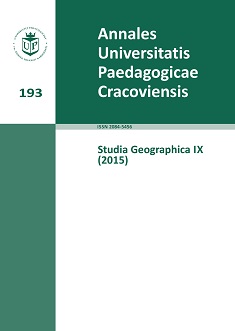Higher education in Portugal, with particular emphasis on geography and geology education
Keywords:
geography, geology, higher education, PortugalAbstract
The article presents the essential features of higher education in Portugal as a part of the European area of higher education, with a particular emphasis on geographical and geological education. The research was carried out mainly on the basis of source materials obtained from Portuguese research centers, as well as statistical data from 2010-2014. Descriptive, statistical and graphical methods were used to present the results. The study covers all the districts of Portugal. Since the 1970s Portugal has made huge progress in the field of education. The level of illiteracy has been significantly decreased, the number of higher schools has multiplied several times and the number of students has increased over fourteen times. Over 380,000 students have attended about 300 higher education facilities in 2013. 5.6% of Portuguese GDP (2010) is spent on education. ECTS credits allow the Portuguese to spent a part of their studies abroad, as well as to receive foreign students. In 1999 Portugal signed the Bologna Declaration and thus committed to taking action in accordance with its terms. Nowadays, concluding their studies after 3 (polytechnics) or 4 years (universities) students can obtain a bachelor’s degree (licenciado), and after further 1.5-2 years - a master’s degree (mestre). Another 3 years of education completed with dissertation’s defense give the doctoral degree (doutor). Geography and geology as fields of studies are available at several universities in Portugal, including the largest one in Lisbon and the oldest one in Coimbra. Courses related to geography are available at numerous other educational institutions, including polytechnics. Higher schools also run other courses of study, which in their programs include courses in geographical sciences as supplementary subjects, useful to students in mastering the knowledge of their field.References
Anuário Estatístico de Portugal (Statistical Yearbook of Portugal) 2012, Ediçáo 2013.
Barata-Salgueiro, T., Cachinho, H.A.P. (2010). Joint Degrees in Geography Higher Education: Potentialities and Constraints. European Journal of Geography, 1, 6–21.
Boroń, A. (2012). System edukacji w Portugalii. W: E. Potulicka, D. Hildebrandt-Wypych, C. Czech-Włodarczyk (red.), Systemy edukacji w krajach europejskich. Kraków: Oficyna Wydawnicza „Impuls”, 311–340.
Cabrito, B.G. (2001). Higher Education and Equity in Portugal. Tertiary Education and Management, 7(1), 23–39.
Dobrzański, R. (1985). Portugalia. Warszawa: Wiedza Powszechna. „Erasmus+ Programme Guide”, Valid as of 1 January 2014, European Commission. Pozyskano z http://ec.europa.eu/programmes/erasmus-plus/documents/erasmus-plus-programme-guide_en.pdf
Goverment of Portugal official site: http://www.portugal.gov.pt./Portal/PT/Governos/Governos Instituto Politecnico de Viseu official side: http://www.ipv.pt/
Martins, C. (2012). Portuguese history storyboard. W: Silva E., Pais C., Pais L.S. (ed.), Teaching Crossroads. 7th Erasmus Week. Instituto Politecnico de Braganca, 145–169.
Karpiński, W. (2003). Partnerstwo społeczne w edukacji zawodowej w Portugalii. Nowa Edukacja Zawodowa, 6, 9–10.
Mosakowski, R. (2002). Szkolnictwo wyższe w Portugalii. Forum Akademickie, 3/2002. Pozyskano z http://forumakad.pl/archiwum/2002/03/index.html, dostęp 14.06.2014.
Neave, G., Amaral, A. (ed.). (2011). Higher Education in Portugal 1974–2009. A Nation, a Generation. 10.1007/978–94–007–2135–7_9, Springer Science+Business Media B.V., 1–417.
Pachociński, R. (2000). Współczesne systemy edukacyjne. Warszawa: Instytut Badań Edukacyjnych.
Portugal em Numeros 2012 in Figures. (2014). Estatisticas oficiais. Instituto Nacional de Estatística. Edição 2014. Pozyskano z http://www.ine.pt/ngt_server/attachfileu.jsp?look_parentBoui=214351311&att_display=n&att_download=y
Portuguese Higher Educaion: A View From The Outside (2013). Bruksela, European University Association. Pozyskano z http://www.eua.be/Libraries/Publication/CRUP_final_pdf.sflb.ashx
Potulicka, E. (2012), Przemiany w analizowanych krajach na tle tendencji ogólnoeuropejskich. W: E. Potulicka, D. Hildebrandt-Wypych, C. Czech-Włodarczyk (red.), Systemy edukacji w krajach europejskich. Kraków: Oficyna Wydawnicza „Impuls”, 483–500.
Rabczuk, W. (1990). Szkolnictwo prywatne w wybranych krajach Europy Zachodniej. Nowa Szkoła, 4, 201–207.
Rabczuk, W. (1991). Szkolnictwo prywatne w Hiszpanii i Portugalii. Nowa Szkoła, 2, 94–101.
Rabczuk, W. (2000). Szkolnictwo prywatne w świecie. Warszawa: Instytut Badań Edukacyjnych IBE.
Rocznik Statystyki Międzynarodowej (Yearbook of International Statistics) (2012), Warszawa: GUS
Seredyńska, A. (2005). Zarys pedagogiki porównawczej: zagadnienia dotyczące systemów wychowania i oświaty w wybranych krajach. Kraków: Wyższa Szkoła Filozoficzno-Pedagogiczna Ignatianum.
System szkolnictwa wyższego w Polsce i Europie. Podstawy sprawnego studiowania. Wyższa Szkoła Gospodarki w Bydgoszczy, 1–20.
The World Factbook. Europe – Portugal. (2014). CIA. Pozyskano z https://www.cia.gov/library/publications/the-world-factbook/geos/print/country/countrypdf_po.pdf
Tracz, M. (2013). Mobility of geography students within the EU educational programmes. W: P. Charzyński, K. Donert, Z. Podgórski, R. Stańczyk (red.), People in the move – teaching bilingual geography. Geography in European Higher Education. t. 17, 134–142, Toruń: EUROGEO & Association of Polish Adult Educators.
Zestawienie systemów edukacji w krajach Unii Europejskiej i EOG (2009). National Summary Sheets, Eurydice, opracowanie: M. Górowska-Fells, B. Płatos. Pozyskano z http://eurydice.org.pl/wp-content/uploads/2014/10/analiza_syntetyczna2.pdf
Zgliczyński, W. (2010). Polityka edukacyjna Unii Europejskiej. Studia BAS, 2(22), 65–88.
Downloads
Published
Issue
Section
License
The submission of a paper to be published is synonymous with an agreement to transfer the copyright free of charge from the author to the publisher. The author also agrees to permit the publisher to publish the paper in printed form, open access online form, digital library form and other digital platforms with which the publisher has or will have a publishing agreement. Furthermore, the author agrees to not limit the number of copies that may be printed or issued by the publisher. In the case of co-authored papers, it is assumed that the corresponding author is authorized to represent the remaining co-authors in this respect. Authors are requested to sign a copyright declaration.

